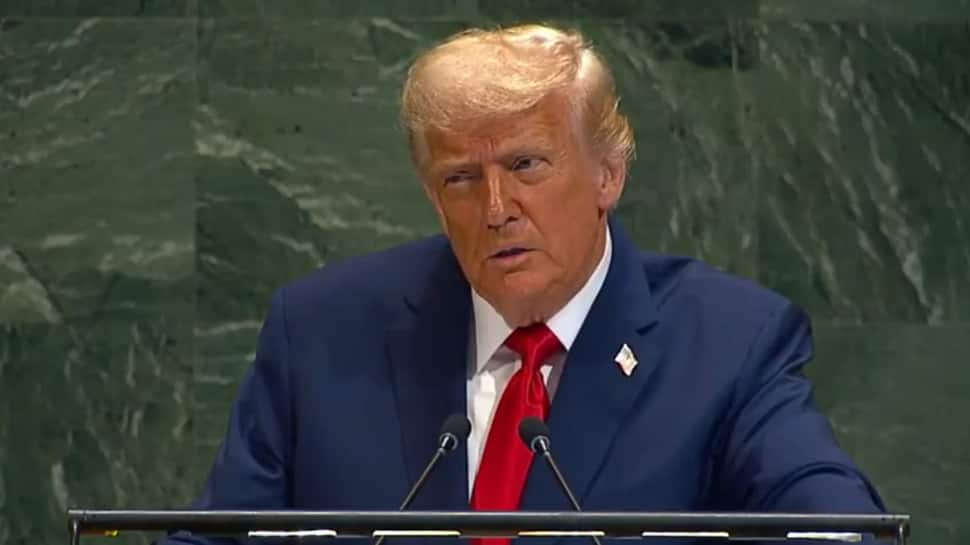During a recent interaction aboard Air Force One, U.S. President Donald Trump expressed strong confidence in the durability of a newly brokered ceasefire agreement between Israel and Hamas, emphasizing the widespread international support that underpins the peace plan. Trump articulated a clear warning to Hamas, stating that if the ceasefire fails, the responsibility would lie squarely with them, and that the consequences would be swift and severe. His optimism about the ceasefire's longevity stems from the fact that, unlike previous attempts, this plan has garnered consensus from multiple parties, including commitments to join the International Stabilization Force (ISF), which is poised to help maintain peace and stability in the region.
President Trump highlighted that a key factor enabling the successful negotiation of this peace plan was the recent neutralization of Iran’s nuclear capability. He explained that a year ago, achieving peace in the Middle East would have been significantly more challenging. The elimination of Iran’s nuclear power, which was imminent within a couple of months, altered the regional dynamics drastically. This decisive action, according to Trump, paved the way for the peace deal, changing the geopolitical landscape and making such an agreement feasible.
As part of his ongoing Asia tour, President Trump was en route to Malaysia to attend the ASEAN summit, aimed at strengthening U.S. relations with Asian countries. During a layover at the Al-Udeid Air Base in Doha, Qatar, Trump welcomed the Emir of Qatar, Tamim bin Hamad Al Thani, and Qatar’s Prime Minister, Mohammed bin Abdulrahman bin Jassim Al Thani, aboard Air Force One. The U.S. president praised the Qatari leadership for their cooperation and support, noting that the discussions during refueling centered on peace in the Middle East. Trump relayed that the Qatari leaders expressed strong confidence in the enduring nature of the peace, highlighting the unprecedented level of stability currently present in the region. Trump described the Emir as a "great guy and a great leader" who played a significant role in facilitating this peace process.
In his remarks on the ISF, Trump indicated that its deployment was imminent, coinciding with ongoing political developments as countries in the Middle East are in the process of selecting new leaders. He asserted that the peace being achieved is "real peace"—a historic milestone given the centuries-long history of conflict in the region. According to Trump, such a lasting peace has never been realized in the past 3,000 years.
The president’s Asia tour includes critical meetings with several leaders, notably Chinese President Xi Jinping. Trump plans to discuss the possibility of China reducing its purchase of Russian oil, a move designed to increase pressure on Russian President Vladimir Putin to pursue a peace agreement amid the ongoing conflict in Ukraine. Trump also mentioned that India has completely cut back on Russian oil purchases, and China has made substantial reductions, attributing these changes to the impact of U.S. sanctions. These energy discussions are part of broader efforts to influence the geopolitical landscape surrounding the Russia-Ukraine conflict.
Another significant issue on Trump’s agenda is the crisis of fentanyl smuggling into the United States, which he alleges originates from China. He reaffirmed his commitment to protecting American farmers and expressed optimism about reaching a comprehensive trade deal that would address multiple concerns, including fentanyl trafficking. Trump emphasized the devastating impact of fentanyl on American communities, highlighting the urgency of international cooperation to curb its flow.
When questioned about the prospects of meeting with Russian President Vladimir Putin, Trump expressed disappointment over the lack of progress toward peace. Despite claiming a historically good relationship with Putin, he indicated his reluctance to engage further without tangible steps toward resolving conflicts. Trump noted that he had hoped for resolutions on issues like the Azerbaijan-Armenia conflict before reaching this point in the Middle East peace process. Nevertheless, Trump shared that Putin had personally praised his efforts in brokering the Middle East peace deal, calling it "amazing" and recognizing that previous attempts by others had failed.
Comparing the complexity of his peace efforts, Trump remarked that his diplomatic achievements involving India and Pakistan were more difficult than the current Russia-Ukraine situation, citing the deep-seated animosity between the two South Asian neighbors. His comments suggest that the challenges in mediating long-standing conflicts vary greatly, but he remains confident in the effectiveness of his diplomatic approach.
In addition to these engagements, Trump expressed openness to meeting North Korean leader Kim Jong Un during his Asia trip, signaling a potential revival of high-stakes diplomacy between the United States and

